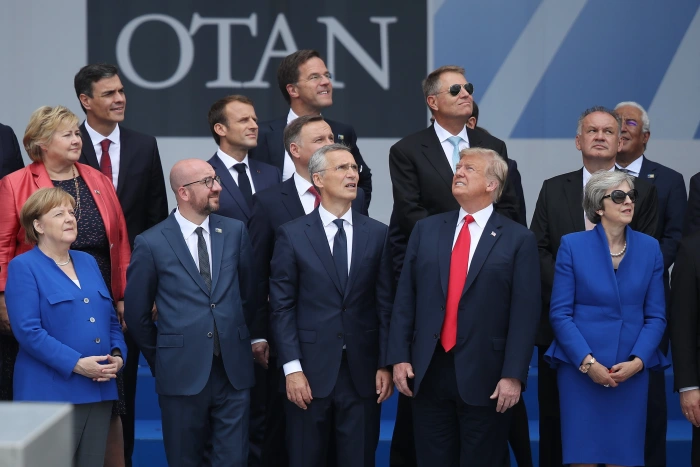Spain’s reluctance to meet NATO’s defense spending targets is casting a long shadow over the upcoming summit, threatening to overshadow key discussions on bolstering the alliance’s collective defense capabilities against an increasingly assertive Russia and the ongoing challenges posed by China. The potential fallout extends beyond the immediate summit; it highlights a broader issue of commitment and burden-sharing within the alliance, raising questions about NATO’s future effectiveness.
The 2% Target: A Source of Ongoing Tension
The core of the problem lies in NATO’s long-standing goal for member states to dedicate 2% of their Gross Domestic Product (GDP) to defense spending. This target, agreed upon in 2014, was intended to ensure adequate resources for collective defense and modernization. While some members, notably the United States, have consistently exceeded this benchmark, many others, including Spain, have lagged significantly. Spain’s current defense spending falls far short of the 2% target, creating friction and undermining the alliance’s overall strength.
Why is Spain Falling Short?
Spain’s underinvestment in defense is a multifaceted issue. Several factors contribute to the shortfall:
- Economic Constraints: Spain, like many European nations, has faced economic challenges in recent years. Prioritizing other domestic needs such as healthcare and social welfare programs often takes precedence over defense spending.
- Political Priorities: Different political parties in Spain hold varying views on defense spending. Some prioritize social programs over military expenditures, leading to a fluctuating commitment to defense budgets. The lack of a consistent, long-term approach hinders substantial investment.
- Historical Context: Spain’s historical military involvement has been less significant compared to other NATO members, resulting in a potentially less robust sense of urgency regarding military preparedness.
- Internal Budgetary Allocations: Even within the existing defense budget, there may be inefficiencies or lack of prioritization of crucial modernization programs.
Implications for the NATO Summit
Spain’s failure to meet the 2% target is not just a matter of numbers; it has far-reaching implications for the NATO summit and the alliance’s overall effectiveness. The summit’s agenda is heavily focused on strengthening collective defense, especially in the face of increased threats from Russia. Spain’s lower contribution directly impacts the alliance’s ability to achieve its strategic goals.
Undermining Collective Defense
A weaker Spanish contribution means a less robust collective defense posture. This not only affects Spain directly but also weakens the alliance’s ability to respond effectively to threats to its members. This weakness can embolden adversaries and potentially invite further aggression. The perceived lack of commitment from a member state, especially one geographically situated within NATO’s area of operation, undermines the credibility and cohesion of the entire alliance.
Impact on Alliance Cohesion
The issue of defense spending is highly sensitive within NATO. It raises questions of burden-sharing and fairness. If major members consistently fail to meet agreed-upon targets, it creates resentment and undermines trust among allies. This can lead to difficulties in reaching consensus on critical decisions and hinder the overall effectiveness of the alliance. Spain’s situation represents a particularly delicate issue, potentially impacting the alliance’s solidarity and collaborative efforts.
Negotiations and Potential Compromises
Despite the potential for discord, the NATO summit provides an opportunity for dialogue and potential compromises. Negotiations may involve exploring flexible timelines for achieving the 2% target, considering Spain’s economic realities. Alternatively, discussions might focus on specific contributions beyond pure financial investment, like providing critical infrastructure or specialized military capabilities.
The Broader Picture: Burden-Sharing and NATO’s Future
Spain’s situation is not an isolated incident. Many NATO members struggle to meet the 2% target, highlighting the broader challenge of burden-sharing within the alliance. This issue requires a deeper and more nuanced approach than simple financial calculations.
Redefining Collective Security
The 2% target, while important, might need to be complemented by a broader definition of collective security. This could include factors beyond just financial contributions, such as:
- Cybersecurity contributions: Investing in and sharing expertise in cybersecurity is vital in today’s digital landscape.
- Intelligence sharing: Effective intelligence cooperation is essential for early threat detection.
- Humanitarian aid and disaster relief: These contributions are crucial for maintaining stability and strengthening partnerships within the alliance’s area of operation.
- Military training and exercises: Joint training and exercises are vital to ensuring interoperability and maintaining combat readiness.
By broadening the scope of what constitutes effective contribution, NATO can accommodate the diverse capabilities and economic realities of its members, fostering a more equitable and sustainable model for collective security.
Conclusion: A Test of NATO’s Solidarity
Spain’s reluctance to meet NATO’s defense spending goals presents a significant challenge to the upcoming summit and the alliance’s long-term success. However, this challenge also provides an opportunity to reassess the alliance’s approach to burden-sharing and collective security. Finding a solution that addresses both Spain’s economic realities and the strategic needs of the alliance will be crucial to maintaining NATO’s cohesion and its effectiveness in addressing current and future security threats. The summit will be a test of NATO’s adaptability and its ability to navigate complex political and economic realities while safeguarding the collective security of its members.










